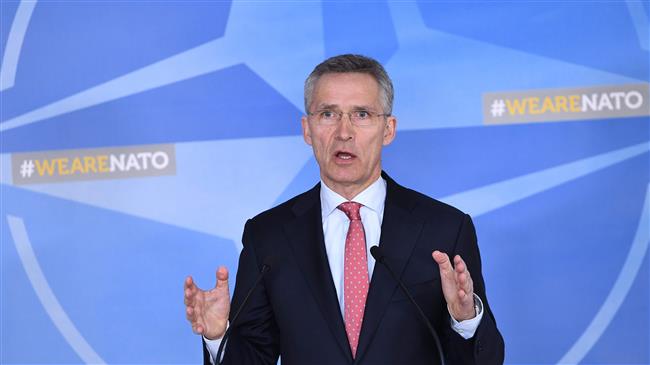NATO has announced its decision to expel seven Russian diplomats and slash the Russian mission to the alliance by a third in retaliation for the alleged nerve-agent poisoning of a former Russian double agent in Britain.

"I have today withdrawn the accreditation of seven staff of the Russian mission to NATO. I will also deny the pending accreditation request for three others," NATO chief Jens Stoltenberg told a news conference at NATO headquarters in Brussels on Tuesday.
"This sends a clear message to Russia that there are costs and consequences for its unacceptable and dangerous pattern of behavior," he added.
Stoltenberg also noted that maximum size of the Russian mission to NATO would also be slashed by a third, from 30 to 20.
Numerous allies of Britain, including the United States, Canada, Australia and dozens of European countries have ordered the expulsion of about 100 Russian diplomats as part of seemingly coordinated attempts against the Kremlin after former Russian double agent Sergey Skripal, 67, and his 33-year-old daughter, Yulia, were found unconscious on March 4 on a bench in the British city of Salisbury. The Skripals remain hospitalized in critical condition.
London claims the Soviet-designed Novichok nerve agent has been used to poison the pair and points the finger at Russia.
Moscow has rejected the claims as “absurd,” saying the substance used in the attack could have originated from the countries studying it, including Britain itself. It has offered cooperation with London in probing the case.
The move prompted Moscow to retaliate by ordering the deportation of diplomats of the mentioned countries.
In one of the most significant actions that the administration of US President Donald Trump has so far taken against Russia, the White House announced on Monday that Washington decided to shut down a Russian consulate in Seattle and deport the 60 Russian diplomats in solidarity with the UK. Later in the day, Russia announced its decision to take the similar retaliatory move against the US.
Stoltenberg said Russia "underestimated the unity of NATO allies", stressing that the mass deportations would bring about material impact on Russian operations.
"The practical implication is that Russia will have a reduced capability to do intelligence work in NATO countries and in those countries they are expelled from," he said.
The NATO chief, however, said the alliance plans to continue its "dual-track approach of strong defense and openness to dialogue" with Russia.
Earlier on Tuesday, Russian Foreign Minister Sergei Lavrov the US’ "colossal pressure and colossal blackmail" led to the decision by more than 20 countries to expel Russian diplomatic personnel.
According to Kremlin spokesman Dmitry Peskov, Russian President Vladimir Putin will make the final decision about how Moscow would respond to the expulsions.
British Prime Minister Theresa May said on Monday that the mass expulsion of Russian diplomats from the EU, the US and Canada was a message against Russian "attempts to flout international law."
LINK: https://www.ansarpress.com/english/9854
TAGS:
































 online news tv
online news tv




